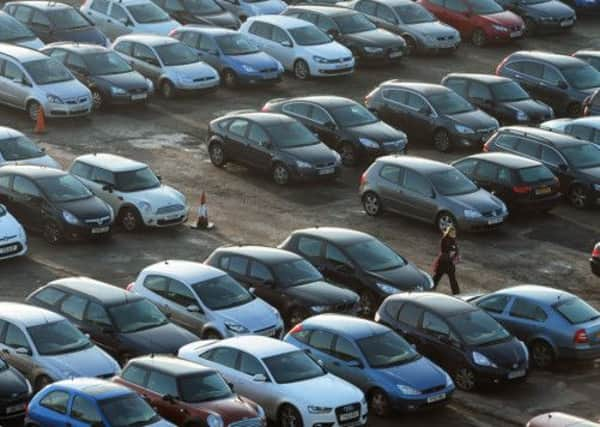Counting the cost of parking to economy of city centres


According to an RAC Foundation report published during the summer, English councils had a total surplus of £565m from parking operations in 2011-12, up £54m on the previous year.
Professor Stephen Glaister, director of the RAC Foundation, described the revenue from parking charges as “a nice little earner” for councils.
Advertisement
Hide AdAdvertisement
Hide AdBut is it really the whole story? If we take Leeds, for instance, the city centre has, at last count, 18,890 car parking spaces. The majority, 13,822, are long stay spaces on street and off street, with the remainder made up of short and medium stay spaces.
Leeds City Council controls just 30 per cent of the city centre’s car parking spaces, the rest are all privately managed with some charging eye-watering rates.
Yet the authority has drawn heavy criticism for trying to push through two new parking-charge policies designed to claw back cash in the wake of budget pressures. Its controversial plans to charge residents for parking outside their homes could already have hit the buffers, after campaigners in London won a landmark High Court judgement which ruled it illegal for one particular cash-strapped council to hike parking charges as a general revenue-raiser.
The Barnet ruling, which essentially means any money raised from parking charges will have to be ringfenced, is now being used as a barometer by other authorities and Leeds bosses admit they will be taking it into account in their final decision.
Advertisement
Hide AdAdvertisement
Hide AdThe council has also given initial approval to introducing Sunday and evening parking charges in its city centre car parks and on-street spaces, and official traffic management orders have now been displayed on lampposts throughout the city centre.
Car parking charges have contributed almost £26 million to Leeds’s council coffers over the last five years at 18 managed car parks. However, council run car parking in the city is still much cheaper than paying to park in a privately run facility. There is no standard charge for council-run spaces. Central Leeds short stay parking is more expensive, with charges varying from £1 for 20 minutes, to £4.90 for two hours.
At the Leeds Met Rose Bowl car park, anyone parking for more than five hours has to pay a standard £25 charge, although the rates are staggered much more cheaply below five hours. In comparison, 12 hours at the council-run Woodhouse Lane multi-storey is just £5.
If the council’s new Sunday and evening charges are pushed through, motorists will be charged £1 for up to four hours on Sunday, of £4 all ay between 10am and 6pm, and £2 on evenings until 10pm.
Advertisement
Hide AdAdvertisement
Hide AdCouncillor Richard Lewis, Leeds City Council’s development and economy boss, admits any talk of putting up car parking charges is understandably unpopular. But he insists the council is not picking on motorists. “The motorist does often feel put upon,” he says.
“But then motoring costs are a big chunk out of everyone’s income. Current costs [of driving a car] might be thousands a year, so us saying £50 for residents’ parking permits is not a big amount. People do have this perception that there is a legal right to park outside their home, which there isn’t.”
He says the council is “not here to hammer car users” and stresses that its charges are still lighter on motorists than private car parks. “When you are talking about us charging in the city centre on Sundays, a lot of the private ones charge anyway, they probably all do.
“People pay there, but expect us to do it for nothing. People will get on to us about parking because they feel that is the one cost in motoring that they have some control over.”
Advertisement
Hide AdAdvertisement
Hide AdHe says council policy makers have considered the impact of any parking policy changes, and it’s not just about “racking up charges” as an easy revenue-maker.
But Paul Watters, head of roads and transport policy at the AA, says there could be no denying that increasing parking charges is “all about revenue”. “Local authorities are under increasing pressure with their budgets,” he says. “Parking is the only thing that is like a tax, that they can manipulate to bring in money.
“We have got 28.5 million cars in the country. Cities like Leeds are busy places and there is development going on and that puts pressure on parking. The council need to set out their case in a transparent way, although it will still be unpalatable to motorists, and they have to think about the vitality of the city centre and about traders.”